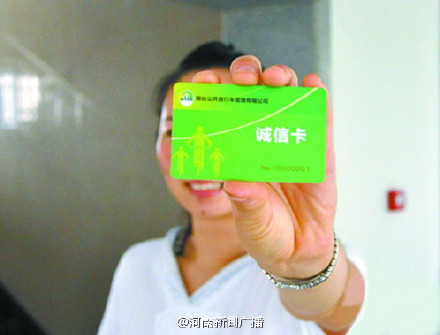Being good has its rewards in Nanjing
By CANG WEI in Nanjing | China Daily | Updated: 2018-09-21 09:37

Dai Honglin, a taxi driver in Nanjing, Jiangsu province, did not expect to receive an "integrity card" when he first started donating blood.
Over the past decade, he has donated more than 4,000 milliliters of blood and hematopoietic stem cells, which qualifies him to be one of just 18,000 people to be rewarded with the card.
The card gives him a 60 percent discount on bus fare, a 50 percent discount on subway fare and free entry at many museums. It's also good for discounts on medical bills and bank loans.
"I didn't expect any reward," the 42-year-old said. "But the card makes me feel warm. It gives me the feeling that other people care about you if you care about them."
Initiated in Nanjing in November 2016, the integrity card aims to reward people who are willing to help others, including blood donors, charitable donors and courageous people who assist in dangerous situations.
Zhou Ping, a cardholder who works as a volunteer at a nursing home in Nanjing's Qinhuai district, said she really enjoys the convenience that comes with the card at the hospital.
"It troubles me to stand in line for hours to see doctors and get medicine," the 56-year old said. "But now I can get examinations and medicine before I pay the medical bill."
The government has signed contracts with three highly recognized hospitals in Nanjing. Different from other hospitals, they allow people to receive treatment first and pay the bill within a certain time limit.
He Jun, deputy director of the Nanjing Development and Reform Commission, said the city tries to reward people and companies that have credibility and integrity.
"The companies with credibility can get bank loans faster and cheaper," he said. "It reduces their burden significantly. In return, they are more willing to continue setting an example for other companies."
He said that dishonest people and companies, by contrast, will be severely punished.
"Dishonest behavior comes with severe consequences," He said. "It will influence their future development in many aspects, such as financing, bidding and receiving government subsidies."
Beyond the 18,000 people who have been rewarded with the card, the city has tried to reward honest residents since 2017.
Although they don't get as many discounts, they can get free admission to some museums and get loans fast from an online platform supported by the government. About 100,000 residents have borrowed a total of 6 billion yuan ($875 million) from the platform.
According to He, the city has been working to establish a credible society since 2002. More than 1.4 billion pieces of positive information have been collected by the 70 government departments in financial, judicial social affairs systems.
Some other Chinese cities have made similar moves to encourage honesty and integrity. Suzhou, for example, rewards upstanding residents with discounts in financing, travel and public transportation.
























